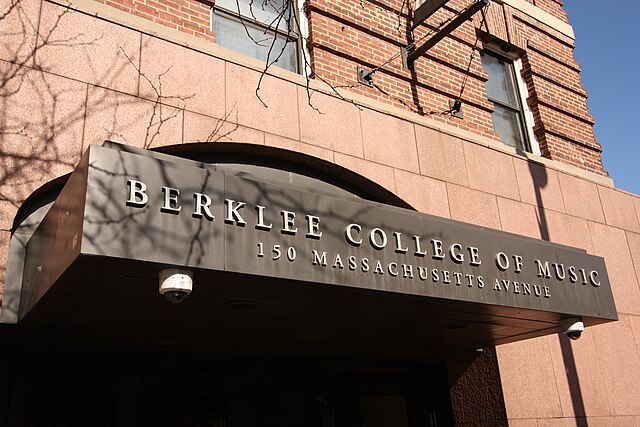
As Thammasat University students grow accustomed to online learning and distance education, some may wish to explore overseas opportunities after they have done their required coursework. Taking an extra class may be informative and help complement main areas of study, giving students new ideas and perspectives and help them to practice their English language usage.
One opportunity to consider may be free massive open online courses (MOOCs) at Berklee College of Music, a private music college in Boston, Massachusetts, the United States of America. It is the largest independent college of contemporary music in the world.
The TU Library owns books published by The Berklee Press, the publishing arm of Berklee College of Music.
Known for the study of jazz and modern American music, it also offers college-level courses in a wide range of contemporary and historic styles, including rock, hip hop, reggae, salsa, heavy metal and bluegrass.
Since 2012, Berklee College of Music has also operated a campus in Valencia, Spain. In December 2015, Berklee College of Music and the Boston Conservatory agreed to a merger. The combined institution is known as Berklee, with the conservatory becoming The Boston Conservatory at Berklee.
Among potential MOOCs available at Berklee, TU students may consider one on Creativity & Entrepreneurship:
Learn skills and listen to examples from world-renown entrepreneurs and innovators as they discuss the parallels between the creative and entrepreneurial journeys — and why entrepreneurship, much like music or creativity, is something we all possess.
About this course
Creativity & Entrepreneurship will help you tap into your inner creativity and learn how to leverage it for career development or business innovation.
Presented by Berklee Institute for Creative Entrepreneurship founder Panos Panay, this course features interviews with world renown entrepreneurs, innovators, songwriters, producers, creative directors, educators, performers, visual artists and chefs as they discuss parallels between the creative and entrepreneurial journeys.
The course approaches entrepreneurship as a creative process, a fundamental human instinct that we all possess and can unlock._ Creativity & Entrepreneurship _applies concepts from the creative and musical creation process, such as observing, prototyping, iterating and embracing failure, as a means of guiding you through the concept of thinking like a startup. You will develop the basic mindset, knowledge, and insights required to pursue an entrepreneurial career, whether as the steward of your own career or as the founder of a new business in any field.
Creativity & Entrepreneurship is about the side of entrepreneurship you won’t learn at a business school but, instead, in the music studio.
What you’ll learn
- How to approach your career or startup as if learning a musical instrument
- Why entrepreneurship, like creativity, is something we all possess
- How to apply “the musician mindset” as means to collaboration and creative problem solving
- Why songwriting is a perfect parallel to career and product development
- Why there’s more to entrepreneurship than business plans and spreadsheets much like there’s more to music than scales and lead sheets
The class instructor will be Panos Panay, a Cyprus-born entrepreneur and educator. Panos Panay is Founding Managing Director of Berklee’s Institute for Creative Entrepreneurship, Berklee College of Music and the founder of online platform Sonicbids. His university webpage notes,
As the founder of Sonicbids, he created the leading platform for bands to book gigs and market themselves online, building a subscriber network of 550,000 bands and 35,000 promoters from more than 100 countries. He led the company as CEO for 13 years, from its inception until after its successful acquisition in a deal backed by Guggenheim Partners.
Panay is also the cofounder of the Open Music Initiative, which has brought together more than 200 leading music, media, technology industry organizations, and academic institutions to create a blockchain-based open protocol for uniform identification of musical rights owners and creators.

Another MOOC opportunity is Introduction to the Music Business:
About this course
Learn the latest about the rapidly changing music industry from recording, publishing, and distribution to legal issues confronting music commerce.
Three things are clear about today’s music industry: The consumption of music is expanding at the greatest rate in history and from the most portals ever imagined, the cost of producing music is decreasing, and the number of artists creating and seeking to expose their work and develop careers through the Internet has increased dramatically. As demand grows and Internet piracy wanes, ad-supported and subscription models will generate unprecedented revenues that will surpass even the best of past earnings. And, many astute “music industry-watchers” predict a steep rise in business activity and trade earnings by the end of the decade.
Whether you’re a music creator, consumer, or facilitator of this process, you’ll want to understand the history, underpinnings, and basics of the music business. This course has been developed to provide students with the latest instruction on the best way for creators, consumers, and facilitators to navigate the resurgence of one of the world’s most exciting industries: the music business. Course author John Kellogg—administrator, educator, entertainment lawyer, performer, and radio and television personality—offers students the opportunity to learn the fundamental principles of the developing new music business, for now and into the future.
What you’ll learn
- The history of the recording industry
- Today’s music business structure
- How to read and understand recording contactracts
- How to protect artisitic work with copyright
- The various roles in the industry, including managers, agents, and attorneys
- How to build a musical brand
- How to plan and organize live performances
The course will be taught by John P. Kellogg, Assistant Chair of Music Business Management, Berklee College of Music. Professor Kellogg is a practicing entertainment lawyer who specializes in the music industry.
Still another choice for a MOOC at Berklee would be Music For Wellness:
Learn how music can help reduce stress and improve your health, and well-being.
About this course
You love music. You listen to music all the time. Maybe you sing, play an instrument, or compose music. You don’t need to have musical talent to use music to enhance your well being, and even your health.
Learn simple techniques to enrich your mind, body, and spirit through music. The methods can be applied in your daily life, particularly when you are feeling down or stressed out. Developed by a board-certified music therapist and a vocalist/pianist/composer/recording artist specializing in Indian music, these strategies combine science with the wisdom of Eastern philosophy.
In the course, discover how to unlock your creativity. You will learn not only how to listen to music in a new way, but also how to listen to the impact that music has on you. You will find out how to care for yourself by practicing coping techniques that are supported by music that is special to you.
What you’ll learn
- The effects music has on the body and the brain
- Strategies and techniques for regulating emotions and stress by integrating music with ancient practices such as mantra and pranayama
- The scientific underpinnings that support the efficacy of ancient traditional practices used to promote wellness
- How and why music can help you to live a happier, healthier life
Instructors will be Suzanne Hanser, Founding Chair of the Music Therapy Department and Annette Philip, Artistic Director of the Berklee India Exchange and Founder-Director of the Berklee Indian Ensemble, both of Berklee College of Music.
(All images courtesy of Wikimedia Commons)

